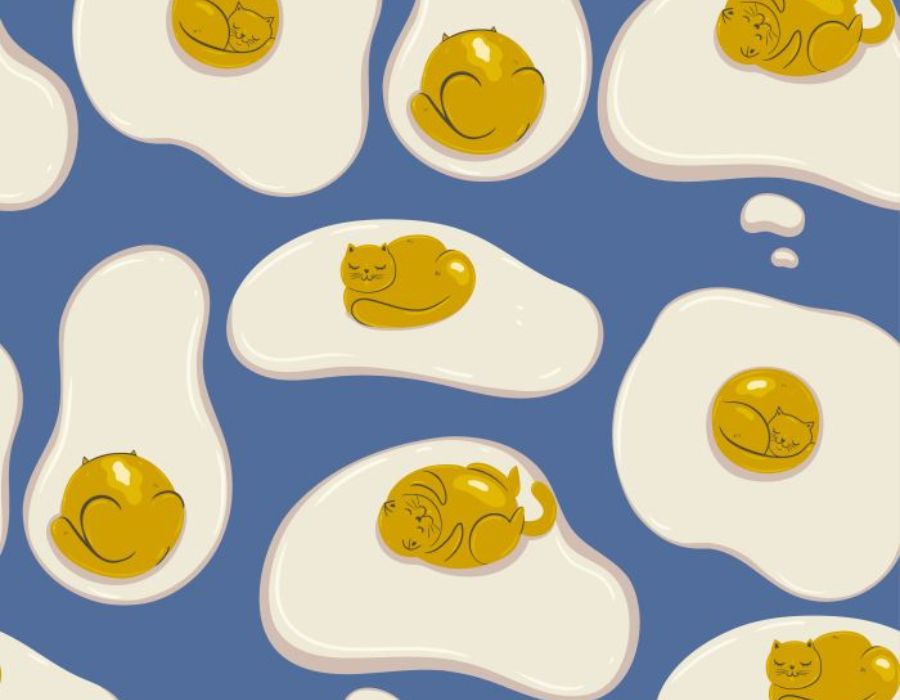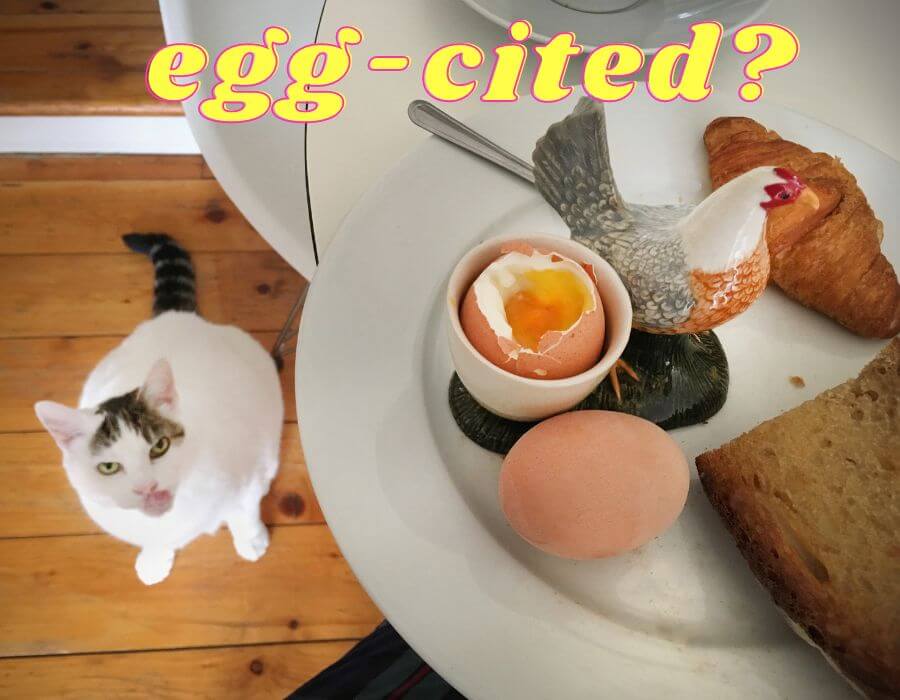Key Takeaways
- Cats are obligate carnivores, which means that their bodies are designed to digest and use only animal-based proteins. 🐱🥚
- Can cats eat eggs, then? YES! They can be a nutritious snack, but they may also contain harmful bacteria.🐱🥚
- Never serve raw eggs to Fluffy. 🐱🥚
- Boiled eggs are the best option.🐱🥚
- Be careful with egg shells! 🐱🥚
What’s There in Raw Eggs?

You may be wondering, can cats eat eggs raw if they do so in the wild? The raw egg is perfectly safe in itself. Unfortunately, chicken eggs from human farms are often contaminated with salmonella and E. coli.
Both bacteria can cause serious illness in cats if their stomach acid doesn’t manage to kill them. Theoretically, it should be acidic enough, but infection can happen if the pH in the cat’s stomach is disrupted somehow. Even if your pet seems perfectly healthy, it’s best to err on the side of caution. Check our article on can dogs eat raw eggs and get to know more on raw pet diets.
According to the Feline Nutrition Education Society, raw yolks are safe for cats in small amounts. The egg yolk is a separate bubble of nutrients that doesn’t get contaminated easily. It’s the raw egg whites that should be treated with suspicion.
What if Your Cat Eats Some Raw Egg?

If your cat ate some raw egg by accident, don’t worry too much. Your pet is unlikely to get sick from a one-off meal. Just be sure to keep an eye on them for the next 24 hours in case they develop any symptoms.
Salmonella infection can cause fever, diarrhea, and vomiting. E. coli can cause bloody diarrhea, abdominal pain, and fever. If your cat has any of these symptoms, take them to the veterinarian as soon as possible.
Read more about raw animal-source protein and raw pet diet risks.
Can Cats Eat Eggs Cooked?
Cooked eggs are safe as long as they’re boiled plain, without any salt, pepper, oil, or butter. A hard-boiled egg – with the eggshell carefully removed – is a rich source of essential amino acids, biotin, and vitamins A, B12 and D.
You can give your cat a small piece of cooked egg as a training reward or an occasional treat. Another way to enrich their diet is to mix the yolk of a soft-boiled egg into their wet food. Don’t overdo it, though – once per week is enough.
Can Cats Eat Scrambled Eggs?
Yes, but we don’t recommend feeding your cat scrambled eggs frequently, because they’re fried with oil or butter. The yolk is already rich in fat, so adding more is not a good idea. Too much fat in your cat’s diet can cause pancreatitis, an inflammation of the pancreas. If you want to give your cat some egg, it’s best to boil it in water.
How About Eggs and Bacon?

Can cats eat eggs with bacon? No, they’re not a safe treat for your cat. First, the egg should be cooked without any additional fat. Secondly, bacon is high in sodium. Salty foods can cause dehydration and an electrolyte imbalance in cats, so it’s best to not give them any.
Can Cats Eat Eggshells?
It’s not harmful for a cat to eat the eggshell, but it’s not a good idea because they can choke on them. Some people who feed their cats raw diets add powdered eggshells as a source of calcium. However, if your pet eats regular cat food, they’re already getting plenty of minerals, so it’s best to skip the eggshells.
Can Kittens Eat Eggs, Too?

Yes, young cats can eat eggs. They’re a great source of protein, and they can help with growth and development. Kittens can have up to one egg per day without any issues. You don’t need to limit their food intake like you do with adult cats. So if they’re still hungry after their regular meal, an egg might appease their appetite. Just be sure to give them cooked eggs, not raw ones.
When Can Eggs Be Harmful to Cats?

Cats with kidney problems shouldn’t eat whole eggs because they’re high in fat and cholesterol. The same goes for overweight cats, as they need to follow a low-fat diet. If you’re unsure whether your cat can have eggs, it’s best to ask your veterinarian.
Even when yolks are off-limits, you can still give your cat boiled egg whites as an occasional treat. It’s all water and protein, after all. They can even be beneficial for cats with kidney disease because they contain less phosphorus than many kinds of meat, which means your cat gets the protein they need without the risk of forming kidney stones.
Can Cats Be Allergic to Eggs?
Some cats can be allergic to eggs, just as some people are. If your cat has a rash, hives, swelling or other signs of an allergic reaction after eating eggs, stop giving them eggs and take them to the veterinarian. Egg allergies can cause serious respiratory problems in cats. So sometimes it’s better to treat yourself to a Caturday than to Mr. Fluffy:
Editor’s Note
Listen up, fellow cat enthusiasts! When it’s time to pamper our purrfect companions with eggs, we’ve got one rule: cook ’em up real good! Raw or half-cooked eggs? No way, Jose! Those sneaky bacteria like Salmonella might hitch a ride and turn our kitties into unhappy campers.
And hey, remember, we’re not running an eggshell eating contest here. Those shells can bring their own set of bacterial buddies and pose a real choking hazard. So, let’s serve up the sizzling, fully-cooked eggs without any shell-acious surprises, and keep our furballs healthy, happy, and egg-statically satisfied!
Oh, how could we possibly forget? We need to stay on our paws when it comes to our kitty’s allergies too! Just like us humans, some cats might have a beef with eggs. Yep, they could be allergic or have an intolerance to those eggy delights.
So, dear kitty guardians, keep a watchful eye for any telltale signs of an allergic reaction like an impromptu egg-splosion of vomiting or diarrhea after an egg feast. If you notice anything fishy, it’s time to bid adieu to the eggs and consult your friendly neighborhood vet. After all, we want our whiskered buddies to stay fabulous and allergy-free!
Enjoy a Boiled Egg With Your Cat – But Not Too Often

Eggs can be a nutritious snack for your pet, but only if they’re cooked properly. Cats shouldn’t eat raw eggs, as those may contain harmful bacteria. Cooked eggs are safe as long as they’re boiled plain and not fried with oil or butter. And remember, scrambled eggs on a daily basis are a no-no.
Kittens can have up to one egg per day, but adult cats should only get them once a week at most. So next time you make breakfast for yourself, you can boil an extra egg for your kitty to enjoy!
❓Frequently Asked Questions❓
How Much Egg Can I Give My Cat?
Once per week is fine! Be a good egg-xample to your cat!
How Do I Prepare Eggs for My Cat?
Boiling an egg is the best way! no seasonings and no butter (only occasionally). You can also combine boiled rice, a mashed boiled egg, chicken stock, and some ground meat! From time to time, you can serve an omelet to your cat, perhaps not too often:
Can Eggs Cause Diarrhea in Cats?
Yes, eggs can cause diarrhea in cats if they are spoiled, undercooked, or contain high levels of fat. To avoid any adverse effects, it is important to feed your cat eggs that have been cooked properly and are not expired.
Can I Feed My Cat Scrambled Eggs Everyday?
To ensure your cat’s health, it is not recommended to feed them scrambled eggs on a daily basis as they are usually fried with oil or butter. The yolk of the egg already provides an excessive amount of fat, thus adding any more through frying is ill-advised.
Similar Posts:
- Can Dogs Eat Eggs? Are Scrambled Eggs Safe for Dogs?
- Can Dogs Eat Raw Eggs? Your Guide to Eggs for Dogs
- Can Dogs Eat Grits? How Much Is Safe for Them?
- Can Cats Eat Peanut Butter – How Much Is Safe for Them?
- Can Dogs Eat Egg Shells? What If Your Dog Ate Eggshells?
- What Human Food Can Cats Eat? 7 People Foods for Cats
- What Human Food Can Dogs Eat? 9 People Foods You Can Give Your Dog
- Can Dogs Eat Lobster?

